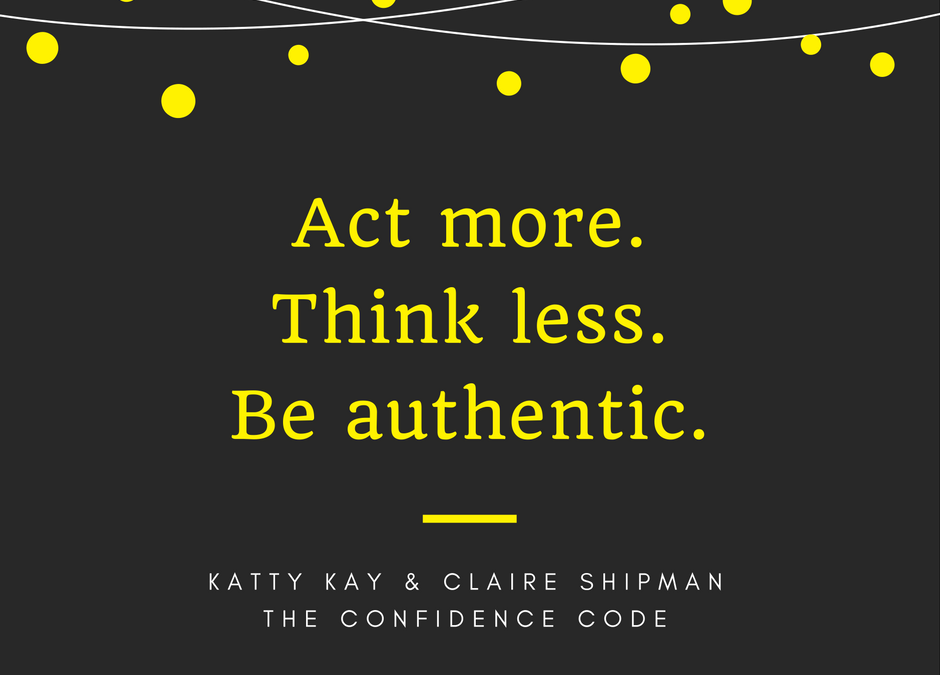Here is a mind-boggling statistic.
Women will only apply for a promotion when they believe they have 100% of the skills in the job description.
Men will apply when they have 60% and figure that they will learn the rest on the job.
This is just one of the many gender-based differences in confidence that I learned at a recent workshop featuring BBC World News America anchor Katty Kay. Together with Claire Shipman, correspondent for ABC News and Good Morning America, Kay spent the past several year researching the world of confidence. Their resulting book, The Confidence Code, is an astonishing look into the science and psychology behind a seemingly enigmatic trait that can spell the difference between success and failure in our daily lives.
In fact, another shocking finding of their research was the fact that confidence is just as important as competence in predicting success. Many women spend their entire careers working hard to be the best at the job, only to be surpassed by men with less expertise.
[bctt tweet=”Confidence is just as important as competence in predicting success.” username=”LaurieMorin”]
It turns out some of our predilection to be confident comes from our genes. We may not be able to control that, but there are plenty of things we can do to build confidence and overcome (or even subtly alter) our confidence DNA.
First, confidence follows action.
In its simplest form, confidence is knowing that we can accomplish something — and you cannot know until you try.
That is why some people exude confidence in their area of expertise, but freeze up when they wander into a new venue. And that is why so many women feel like a fraud at work.
By definition, people who are perfectionists lack confidence. They are afraid to fail, learn from their mistakes, and try again. Yet those are exactly the qualities that lead to advancement and success in a career.
I experienced this phenomenon big time when making the transition from law professor to life coach. I was very confident in the classroom with a room full of law students, but way outside of my comfort zone in a meeting room with a group of successful professionals. I literally spent years taking courses, planning, and creating programs to avoid taking action and risking failure. Needless to say, all the studying and planning did nothing to increase my confidence.
The primary key to developing confidence is mastery. You have to get out of your comfort zone, try hard things, fall down and pick yourself up again. Then you have to give up the things that are holding you back.
The main takeaway here — when in doubt, act.
Second, worrying and overthinking are great distractors.
One of the most unexpected conclusions Kay and Shipman came to was that confidence is not all in your head. In fact, you have to get out of your head to create it and use it.
If you let yourself be consumed with fear and doubt, you will never take the action needed to develop mastery. And yes, there is actually a worrier gene generally associated with higher IQ’s and higher stress and social anxiety levels.
The good news is we can actually influence these genes by changing our behavior. Basic meditation is one of the most effective techniques for turning down the activity in the amygdala, the brain’s fear center. If you have tried it, you are probably painfully aware of the meaningless chatter that Buddhists refer to a “monkey mind.” Other kinds of cognitive behavioral therapy are also effective in identifying and changing subconscious fears and beliefs that are holding you back.
Bottom line, to build confidence, you have to get a grip on your fears. The old adage “feel the fear and do it anyway” is only partially right. You also have to “rewire” your brain to reduce the level of subconscious chatter holding you back.
Third, and perhaps most important. When in doubt, be yourself.
Authenticity is the missing ingredient for many women in business. We are so busy trying to fit in and please others that we forget what we really stand for.
Truly successful people — male and female — embrace their uniqueness and choose to wear it as a badge of honor. What do people like Steve Jobs, Oprah Winfrey, Mother Theresa, and Einstein have in common? They all did things differently from the norm, and were not afraid to stand out from the crowd.
Setting goals based on your own values and personality is a huge confidence booster. Not to mention that it is a huge relief to just be who you are, warts and all.
The lesson here is to stop trying to please everyone else, and relish the satisfaction of pleasing yourself.
So, cracking the confidence code turns out to be a relatively simple formula. Act more, think less, and be true to yourself. As it turns out, these are the keys not only to success, but also to a more satisfying life.


